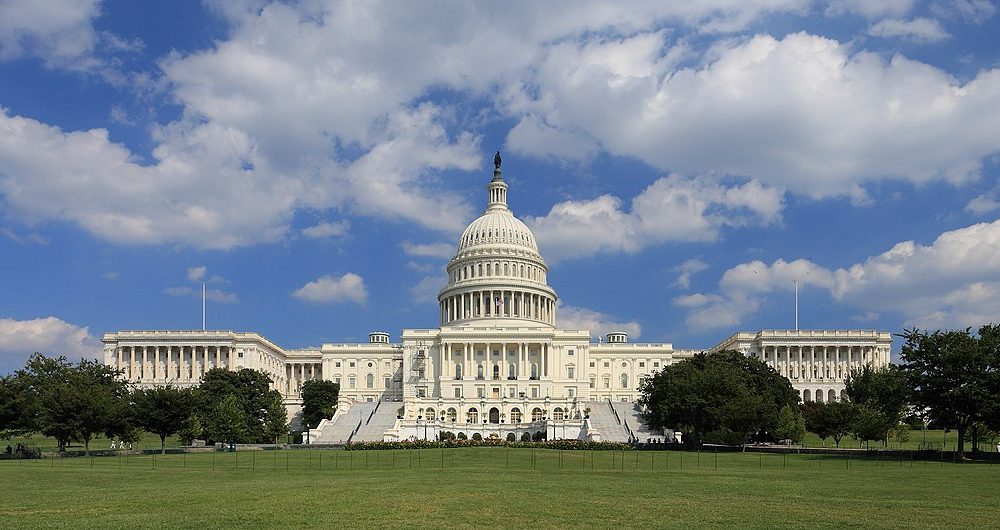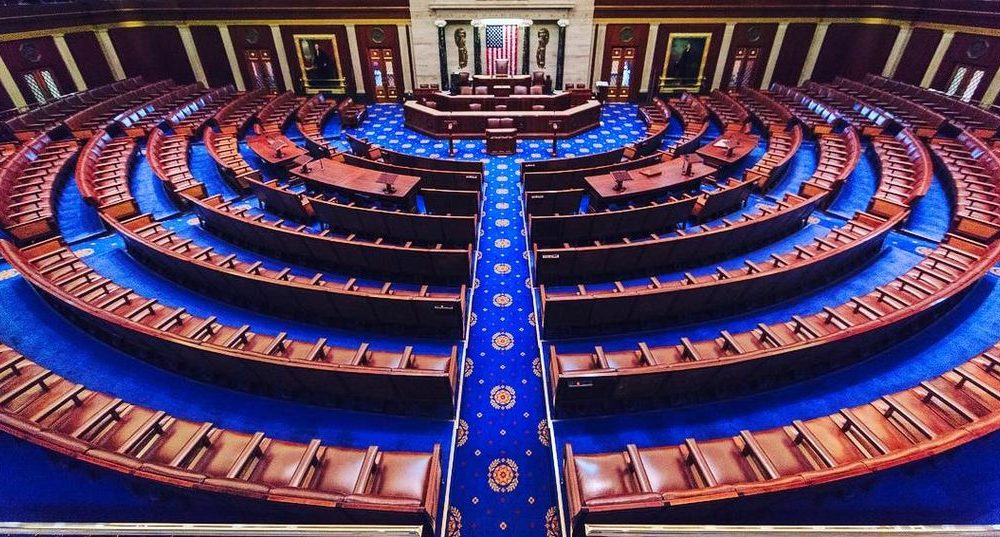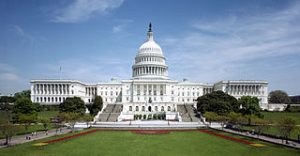
US Capitol - by Martin Falbisoner via Wikimedia Commons
Legislation aimed at reforming U.S. campaign finance, lobbying, and ethic laws has passed in the U.S. House of Representatives. H.R. 1, For the People Act 2021, is a sweeping 791-page bill. The proposed new law, which passed the House on […]
Legislation aimed at reforming U.S. campaign finance, lobbying, and ethic laws has passed in the U.S. House of Representatives. H.R. 1, For the People Act 2021, is a sweeping 791-page bill. The proposed new law, which passed the House on March 3, now heads to the U.S. Senate.
Among the changes in the bill, H.R. 1 restructures the Federal Election Commission and amends federal conflict of interest and lobbying laws. Introduced by Rep. John Sarbanes, the bill requires enhanced disclosure of donors making political contributions, creates a multiple matching system for small donations for political campaigns, and amends rules governing super PACs.
If passed, the bill also requires presidential candidates to disclose their tax returns, prohibits partisan gerrymandering, increases oversight over election vendors, creates an automatic voter registration across the country, and changes registration requirements for lobbyists and foreign agents.
January 14, 2021 •
Federal Bills Concerning Ethics Being Reintroduced

U.S. House of Representatives Chamber - from their Public Domain
Legislation aimed at reforming U.S. campaign finance, lobbying, and ethic laws is being reintroduced in the U.S. House of Representatives. H.R. 1, For the People Act 2021, is a sweeping 791-page bill incorporating much of H.R. 1 introduced in 2019 […]
Legislation aimed at reforming U.S. campaign finance, lobbying, and ethic laws is being reintroduced in the U.S. House of Representatives. H.R. 1, For the People Act 2021, is a sweeping 791-page bill incorporating much of H.R. 1 introduced in 2019 by the last Congress. That bill passed the House in the previous Congress but never got a vote in the U.S. Senate.
Among the changes in the bill, H.R. 1 restructures the Federal Election Commission and amends federal conflict of interest and lobbying laws. Introduced by Rep. John Sarbanes, the bill requires enhanced disclosure of donors making political contributions, creates a multiple matching system for small donations for political campaigns, and amends rules governing super PACs. If passed, the bill also requires presidential candidates to disclose their tax returns, prohibits partisan gerrymandering, increases oversight over election vendors, creates an automatic voter registration across the country, and changes registration requirements for lobbyists and foreign agents.
Another bill reintroduced is H.R. 244, Executive Branch Conflict of Interest Act, which expands and establishes new prohibitions related to conflicts of interest involving certain federal government employees, prohibits a federal government employee from accepting a bonus from a former private sector employer for entering government service, and increases lobbying restrictions to two years for certain senior officials. H.R. 244 also prohibits a procurement officer in the federal government from working for a company that received a contract overseen by the procurement officer during the officer’s last two years in government service.
March 8, 2019 •
US House Passes HR 1, For the People Act of 2019

On March 8, the U.S. House of Representatives passed a sweeping campaign finance, lobbying, ethics, and election gerrymandering reform bill. Introduced by Rep. John Sarbanes, House Bill 1, the For the People Act of 2019, requires any organization involved in […]
 On March 8, the U.S. House of Representatives passed a sweeping campaign finance, lobbying, ethics, and election gerrymandering reform bill.
On March 8, the U.S. House of Representatives passed a sweeping campaign finance, lobbying, ethics, and election gerrymandering reform bill.
Introduced by Rep. John Sarbanes, House Bill 1, the For the People Act of 2019, requires any organization involved in political activity to disclose its largest donors, creates a multiple matching system for small donations for political campaigns, and amends rules governing super PACs.
Additionally, the bill restructures the Federal Election Commission, amends the federal conflict of interest law, and expands the revolving door provision by prohibiting Members of Congress from serving on corporate boards.
If enacted, the bill also requires presidential candidates to disclose their tax returns, prohibits partisan gerrymandering, increases oversight over election vendors, creates an automatic voter registration across the country, and changes registration requirements for lobbyists and foreign agents.
January 7, 2019 •
First U.S. House Bill Introduced is Sweeping Campaign Finance Bill
The first piece of legislation introduced into the new U.S. House of Representative was a sweeping 571-page campaign finance bill. Introduced by Rep. John Sarbanes, House Bill 1, the For the People Act, requires any organization involved in political activity […]
 The first piece of legislation introduced into the new U.S. House of Representative was a sweeping 571-page campaign finance bill. Introduced by Rep. John Sarbanes, House Bill 1, the For the People Act, requires any organization involved in political activity to disclose its largest donors, creates a multiple matching system for small donations for political campaigns, and amends rules governing super PACs.
The first piece of legislation introduced into the new U.S. House of Representative was a sweeping 571-page campaign finance bill. Introduced by Rep. John Sarbanes, House Bill 1, the For the People Act, requires any organization involved in political activity to disclose its largest donors, creates a multiple matching system for small donations for political campaigns, and amends rules governing super PACs.
The bill also restructures the Federal Election Commission, amends the federal conflict of interest law, and expands the revolving door provision by prohibiting members of Congress from serving on corporate boards. If passed, the bill also requires presidential candidates to disclose their tax returns, prohibits partisan gerrymandering, increases oversight over election vendors, creates an automatic voter registration across the country, and changes registration requirements for lobbyists and foreign agents.
Sarbanes argued the rational for the bill in his press release, stating, “The bold, transformative set of reforms that we introduced today will strengthen our democracy and return political power to the people by making it easier, not harder, to vote, ending the dominance of big money in our politics and ensuring that public officials actually serve the public.”
July 30, 2018 •
Legislation Introduced to Amend Federal Lobbying Law
On July 25, Sen. Michael Bennet and Rep. John Sarbanes introduced legislation aimed to make several changes to the Lobbying Disclosure Act of 1995 (LDA). Currently, part of the LDA’s requirements for determining whether an individual is required to register […]
 On July 25, Sen. Michael Bennet and Rep. John Sarbanes introduced legislation aimed to make several changes to the Lobbying Disclosure Act of 1995 (LDA).
On July 25, Sen. Michael Bennet and Rep. John Sarbanes introduced legislation aimed to make several changes to the Lobbying Disclosure Act of 1995 (LDA).
Currently, part of the LDA’s requirements for determining whether an individual is required to register as a federal lobbyist include if he or she makes two or more lobbying contacts and if his or her lobbying activities constitute at least 20 percent of the individual’s time in services for a client over any three-month period. The proposed legislation, introduced as two identical bills in both houses of Congress as Senate Bill 3274 and House Bill 6533, would require registration if a lobbyist makes more than one lobbying contact over a two-year period and would eliminate the 20 percent time threshold used in determining whether registration is required.
This bill would also require individuals who provide paid strategic advice in support of a lobbying contact with a government official to register as lobbyists even if they do not directly make the contact, prohibit lobbyists from soliciting, bundling or providing campaign contributions above a total equal to an individual’s campaign contribution limit, and prohibit members of Congress, senators, and candidates for Congress or the Senate from soliciting campaign contributions from lobbyists when their respective bodies are in session.
Additionally, the legislation would no longer permit foreign agents from avoiding registration under the Foreign Agent Registration Act (FARA) by registering under the LDA.
More information is available from the press releases of Sen. Bennet and Rep. Sarbanes, and from a policy summary of the Democracy Reform Task Force, of which Sarbanes is the Chairman.
State and Federal Communications, Inc. provides research and consulting services for government relations professionals on lobbying laws, procurement lobbying laws, political contribution laws in the United States and Canada. Learn more by visiting stateandfed.com.

